“No, I am not disappointed, on the contrary, the idea was to talk about the subject again, and we got a lot of interesting information, especially regarding the discussions within the greater region on the 25% limit for the social security component,” said Katia Sabrina Litim, who launched the petition, following the exchange with lawmakers.
The petition called for “two days of teleworking per week for everyone, including cross-border workers” and had collected a total of 13,892 signatures. A petition must secure 4,500 signatures for a debate in parliament.
At her side in the Chamber of Deputies was her colleague at Quintet Private Bank and former secretary general of Aleba, . In addition to lawmakers, the ministers of finance, social security and labour-- (DP), (LSAP) and (LSAP)--joined the debate.
What about “non-teleworkable” jobs?
The petitioners gave a 10-minute presentation to support their argument, including a recent UEL study. “Four out of ten employees are ready to leave their job because of the commuting time, and more than half of 15 to 25-year-olds would refuse a job without teleworking,” said Litim.
“The attractiveness of Luxembourg inevitably depends on raising the thresholds for teleworking in terms of tax and social security, because one of the main arguments is to keep the financial centre attractive. Of course, we know the harmful effects of teleworking, the financial impact on the hotel industry, trade, restaurants, etc. There are also abuses, so there has to be a balance between no limit, as during the covid period, and zero telework. Two days a week is therefore a fair figure.”
The petition broke the 2022 record for signatures, with MPs congratulating Litim on the initiative. “I think the signatories should do some lobbying work in their country to make things happen, to say that they consume in their country,” said (Pirate Party).
During the pandemic, bordering countries had lifted teleworking caps that restrict access to social security or result in double taxation of employees in their country of residence and work. But these agreements are now back in place.
“Shouldn’t we also ask what is offered in the professions where telework is not possible,” Clement asked.
Litim replied that she did not think there was a debate on the latter subject: “These employees choose to work in such a job, so I don’t think they will be able to claim an additional right, or else they have to change jobs.”
A report published in March
(LSAP), former minister of labour and current chair of the committee on labour, employment and social security, explained that the subject would be studied in the coming weeks in the sub-committee on telework with the trade unions and the UEL business union.
“We have achieved a lot in the framework of bilateral agreements with Belgium, France and Germany. There is no point in working only in one sector, we need to make progress on social security and taxation too.” A report is due to be published in March-April on the subject.
On the social security front, minister Claude Haagen confirmed information given last October: “At the beginning of August, we asked for the opening of multilateral negotiations with Belgium, France and Germany to raise the threshold for teleworking to 41%. We have already had positive feedback from the Belgians and Germans, and we are waiting for official feedback from France.”

From left to right: Nancy Arendt, Laurent Mertz, Katia Sabrina Litim, Fernand Etgen, Yuriko Backes, Dan Kersch. Photo: Chamber of Deputies
For her part, Backes supported the fact that “this is a very important subject, we all talk about well-being at work, work-life balance, attractiveness, the competitiveness of our country, and this is something that is also close to my heart, I am the first one concerned. Two-thirds of cross-border workers have 34 days of authorised teleworking, but for Germans it is still 19, and for the moment they are not thinking of increasing this limit. I am doing everything I can to improve the situation, because it is not easy for employers to manage three different situations either, but it does not depend on me alone.”
In the end, what emerged from this public debate is that the two days of teleworking for all (insofar as the type of job allows it) are far from being guaranteed in the future, in particular because cross-border workers depend on agreements that should be concluded between Luxembourg and neighbouring countries.
“This subject will not move forward without you,” Litim was also keen to point out. “The issue of teleworking does not only concern cross-border workers, but it concerns all those who want to see the city continue to develop, those who want to reduce traffic jams (...). I am not in favour of unlimited telework, we must keep some face-to-face work, but promoting balanced telework is important. Luxembourg must be the European leader in this field.”
This story was first published in French on . It has been translated and edited for Delano.
